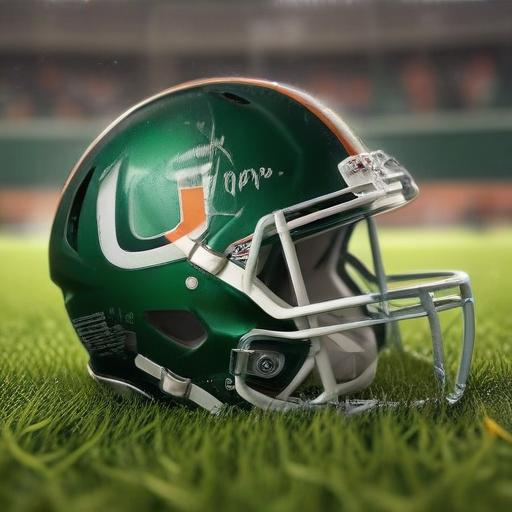Miami’s season preview centers on a program that has rebuilt its roster and its expectations around Mario Cristobal’s vision. With No. 10 Miami hosting No. 6 Notre Dame at Hard Rock Stadium this Sunday night, the Hurricanes arrive with an abundance of talent and a clear identity: bullyball up front, a relentless edge, and a roster that’s been crafted to win at the line of scrimmage.
Cristobal has been clear about the blueprint: build the lines first, then let the rest of the program take shape. The Hurricanes’ offensive and defensive lines are at the heart of that plan, and the roster reflects the emphasis on size, speed, and physicality. This approach mirrors the program’s recent spending and recruiting push, aided by strong backing from boosters and a new era of NIL resources designed to accelerate development and attract top prospects. In this cycle, Miami is targeting first-round NFL-caliber talent along both trenches, reinforcing the coach’s intention to win with a balanced, physical style.
The recruiting machine is clearly rolling. Five-star talent has joined the fold, and early indicators suggest the roster could produce high-end NFL prospects in the near term. Names like Francis Mauigoa, an elite offensive tackle, and Rueben Bain, a standout defensive end, have been cited in early projections as future top picks for 2026. The mix of elite high school talent and current experience is designed to translate into a sustainable, championship-caliber program rather than a quick-fix rebuild.
Cristobal’s leadership is also reflected in the personnel payroll and the team’s public profile. Carson Beck, Miami’s quarterback, is among the program’s highest earners, with a reported $4.5 million salary this year, highlighting the university’s commitment to high-impact leadership at the most important position. Cristobal himself is compensated at roughly $8 million annually, underscoring the expectation that Miami is serious about contending at the highest level. The Hurricanes have leveraged the new era of resources to support player development and on-field performance, and ticket sales reflect that confidence, with 42,000 season-ticket holders showing strong belief in the program’s trajectory.
The schedule lays out a stern path early in the season. The front-loaded slate features Notre Dame and Florida in the opening stretch, testing Miami’s readiness and depth right from the start. While the ACC landscape remains a factor, the absence of Clemson from this year’s early slate and the strength of the non-conference games create an environment where Miami can demonstrate progress quickly if the lines, the quarterback, and the supporting cast perform as promised. Carson Beck’s transition from Georgia, where he compiled a 24-3 record against SEC competition, will be watched closely as he faces ACC defenses that demand a different rhythm and precision.
There’s momentum to ride. Miami athletic director Dan Radakovich has spoken about the program’s progress, emphasizing that the “cornerstones”—the lines, the culture, and the commitment to playing fast and physical—are coming together. Former Miami great Jimmy Johnson has noted the team’s size and potential, adding a sense of continuity with the program’s championship past while acknowledging that this version of Miami must prove it can finish strong and win the right way.
Season expectations are high, but the message from Cristobal and his leadership team is consistent: if this new Miami can translate its depth and physicality into consistent execution, the Hurricanes are positioned to contend. The goal isn’t merely to reach the college football playoff; it’s to push for a title with a roster and a system built to sustain success over time.
What to watch
– Offensive and defensive line play: The program’s emphasis on the lines will be a key determinant of how far Miami can go.
– Quarterback development: Carson Beck’s adaptation to ACC defenses and his ability to lead the offense with precision will shape the team’s ceiling.
– Early-season tests: The Notre Dame and Florida games will reveal how well the roster and coaching staff have integrated the new approach.
– Depth and versatility: With a rebuilt roster and strong NIL backing, Miami’s ability to rotate players and maintain physical pace will matter down the stretch.
Why this matters
– The program has invested in a long-term vision, pairing recruiting strength with updated resources to sustain competitiveness.
– A strong start could validate the “Miami is back” narrative and build confidence for the rest of the season and beyond.
– If the lines and quarterback play exceed expectations, Miami could take a decisive step toward championship contention and return to national relevance.
Summary
Miami is betting on a big, physical identity under Cristobal, backed by top-tier talent, substantial NIL support, and a schedule that tests early. The season hinges on whether the lines win the battle at the line of scrimmage, Beck can command the offense against ACC defenses, and the team can translate talent into consistent execution. If those pieces click, the Hurricanes have a real path to contending for a title.
Additional comments
– The combination of star recruits and proven NFL-caliber depth could accelerate Miami’s return to national relevance, provided there’s steady growth in game-management and closing out tight games.
– The season’s outcome will likely depend on in-game adjustments and the coaching staff’s ability to leverage the roster’s physical advantages, especially in late quarters.
– A positive, sustained trajectory would reinforce Miami’s branding as a program that not only attracts elite talent but also develops it into championship-caliber performance.
Overall, the piece presents a hopeful view of Miami’s trajectory under Cristobal, highlighting the program’s strategic emphasis on lines, development, and resources as the engine for future success.
